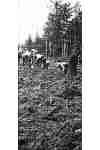
|
Working on Castle-Laggan Motor Road. Report of the Commisioner of the Dominion Parks, 1916 (Photo courtesy of Whyte Museum of the Canadian Rockies |
Between 1914 and 1920, at the time of World War I, some 5,000 Ukrainian Canadians were interned simply because they came from parts of Ukraine then controlled by enemies of the Allied Forces. Many, many more were forced to register as "enemy aliens" - some 80,000 had to report monthly to the police. They lost the right to vote and the right to become naturalized Canadian citizens, and their Ukrainian press was censored.
The accounting firm of Price Waterhouse reported in a confidential study to the Ukrainian Canadian Congress that many of these Ukrainians were interned due to ethnic prejudice rather than wartime suspicions. The findings of that report, just made public by the UCC, indicated that some 3,000 of these Ukrainians were wrongfully interned and that Ukrainian Canadians suffered economic losses of between $21.6 million and $32.5 million while they were interned.
Since 1986, the Ukrainian community of Canada has been seeking an acknowledgement and redress for these violations of Ukrainian Canadians' human rights during the first world war. The Redress Council of the Ukrainian Canadian Civil Liberties Association seeks a public acknowledgement of this injustice, amendments to Canadian law that would prevent such occurrences, placement of historical markers at internment camp sites and a "symbolic redress" package to be negotiated with the Ukrainian-Canadian community. The redress committee of the Ukrainian Canadian Congress seeks a public acknowledgement and a community package, possibly in the form of a community development fund. Both groups are against any sort of omnibus apology that would address the redress concerns of the Ukrainians, Chinese (who suffered unfair entry taxes) and Italians (who suffered wrongful discrimination during World War II). The Chinese and Italians seek individual restitution, while the Ukrainians do not - after all, there is only one known Ukrainian survivor of this shameful episode in Canadian history.
In 1988, it should be noted, Minister of Multiculturalism Gerry Weiner told Ukrainian Canadians the issue would be dealt with "expeditiously." Prime Minister Brian Mulroney himself promised on two occasions, in 1990 and 1992, that Ukrainian Canadian claims would be resolved soon. And still the Canadian government has done nothing to address these wrongs, even though a precedent had been set by the Japanese Canadian redress settlement of 1988, when that community received $12 million for a community development fund plus individual restitution of $21,000 for survivors of World War II internment camps.
Perhaps most distressing was the reaction of the Historic Sites and Monuments Board of Canada, which in March 1991 declared that internment of Ukrainian Canadians was not "in and of itself, of national historic significance." This year, Environment Minister Jean Charest refused to acknowledge the significance of the Castle Mountain internment camp in Banff National Park in Alberta.
Most recently, in March of this year, when the UCCLA sought meetings with the prime minister and/or the minister of multiculturalism, neither made himself available, despite the fact that the delegation was headed by the last Ukrainian survivor of the internment operation, Mary Manko Haskett, now 84.
Now the UCCLA's and UCC's voices have been joined by those of Roy Romanow, premier of Saskatchewan, who told the CBC it's time the federal government acknowledged the unjust internment of Ukrainian Canadians. In addition, two political leaders from Ukraine, former political prisoner Vyacheslav Chornovil, who heads the Popular Movement of Ukraine (Rukh), and Vitaliy Zhuravsky, leader of the Christian-Democratic Party of Ukraine, sent a letter to Prime Minister Mulroney asking that he "do what is right and honorable" in settling the redress issue before he leaves office.
And, Mrs. Haskett has penned her own letter to Mr. Mulroney: "... I believe that you, Mr. Prime Minister, have a unique and historic opportunity to show understanding and compassion for those who fell victim [to Canada's first national internment operations]. Before you leave office, I appeal to you to honor the Ukrainian-Canadian community's request for acknowledgment and redress. I do this on behalf of my parents, for those many thousands of others who can no longer speak, for my sister Carolka [who died at the Spirit Lake camp at the age of 2 ]. Our community, all of us, suffered a national humiliation. Few Canadians, even today, realize how traumatic and damaging those internment operations were... I believe you can appreciate how important it is for me to have this injustice dealt with in my lifetime..."
Surely, that is the least the Canadian government can do. The internment operations must be acknowledged, and the truth must be made known to the public. Mr. Mulroney, do the right thing.
![]() Return to Righting An Injustice Page
Return to Righting An Injustice Page
![]() Return to Internment of Ukrainians in Canada 1914-1920 Page
Return to Internment of Ukrainians in Canada 1914-1920 Page
![]() Return to Ukrainian History Page
Return to Ukrainian History Page
![]() Return to InfoUkes Home Page
Return to InfoUkes Home Page
Document URL: http://www.infoukes.com/history/internment/booklet02/doc-091.html
Copyright © 1994 Ukrainian Canadian Civil Liberties Association
Copyright © 1994 Lubomyr Luciuk
We acknowledge the help in the preparation of this document by Amanda Anderson
Page layout, design, integration, and maintenance by G.W. Kokodyniak and V. Pawlowsky
Copyright © 1996-1997 InfoUkes Inc.
E-mail: internment@infoukes.com
|
since Mar 1 1997 |
InfoUkes Inc. Suite 185, 3044 Bloor Street West Etobicoke, Ontario, Canada M8X 2Y8 Tel: (416) 236-4865 Fax: (416) 766-5704 |
Originally Composed: Wednesday December 4th 1996.
Date last modified: Thursday October 30th 1997.